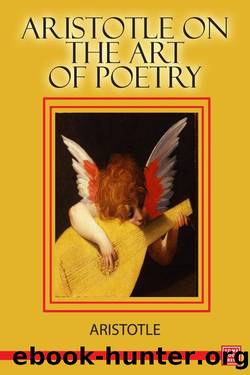Aristotle on the Art of Poetry by Aristotle

Author:Aristotle
Language: eng
Format: azw3
Publisher: Some Good Press
Published: 2015-03-09T16:00:00+00:00
14
The tragic fear and pity may be aroused by the Spectacle; but they may also be aroused by the very structure and incidents of the playâwhich is the better way and shows the better poet. The Plot in fact should be so framed that, even without seeing the things take place, he who simply hears the account of them shall be filled with horror and pity at the incidents; which is just the effect that the mere recital of the story in Oedipus would have on one. To produce this same effect by means of the Spectacle is less artistic, and requires extraneous aid. Those, however, who make use of the Spectacle to put before us that which is merely monstrous and not productive of fear, are wholly out of touch with Tragedy; not every kind of pleasure should be required of a tragedy, but only its own proper pleasure.
The tragic pleasure is that of pity and fear, and the poet has to produce it by a work of imitation; it is clear, therefore, that the causes should be included in the incidents of his story. Let us see, then, what kinds of incident strike one as horrible, or rather as piteous. In a deed of this description the parties must necessarily be either friends, or enemies, or indifferent to one another. Now when enemy does it on enemy, there is nothing to move us to pity either in his doing or in his meditating the deed, except so far as the actual pain of the sufferer is concerned; and the same is true when the parties are indifferent to one another. Whenever the tragic deed, however, is done within the familyâwhen murder or the like is done or meditated by brother on brother, by son on father, by mother on son, or son on motherâthese are the situations the poet should seek after. The traditional stories, accordingly, must be kept as they are, e.g. the murder of Clytaemnestra by Orestes and of Eriphyle by Alcmeon. At the same time even with these there is something left to the poet himself; it is for him to devise the right way of treating them. Let us explain more clearly what we mean by 'the right way'. The deed of horror may be done by the doer knowingly and consciously, as in the old poets, and in Medea's murder of her children in Euripides. Or he may do it, but in ignorance of his relationship, and discover that afterwards, as does the Oedipus in Sophocles. Here the deed is outside the play; but it may be within it, like the act of the Alcmeon in Astydamas, or that of the Telegonus in Ulysses Wounded. A third possibility is for one meditating some deadly injury to another, in ignorance of his relationship, to make the discovery in time to draw back. These exhaust the possibilities, since the deed must necessarily be either done or not done, and either knowingly or unknowingly.
The worst situation is when the personage is with full knowledge on the point of doing the deed, and leaves it undone.
Download
This site does not store any files on its server. We only index and link to content provided by other sites. Please contact the content providers to delete copyright contents if any and email us, we'll remove relevant links or contents immediately.
The remains of the day by Kazuo Ishiguro(8969)
Tools of Titans by Timothy Ferriss(8363)
Giovanni's Room by James Baldwin(7325)
The Black Swan by Nassim Nicholas Taleb(7106)
Inner Engineering: A Yogi's Guide to Joy by Sadhguru(6785)
The Way of Zen by Alan W. Watts(6600)
Asking the Right Questions: A Guide to Critical Thinking by M. Neil Browne & Stuart M. Keeley(5757)
The Power of Now: A Guide to Spiritual Enlightenment by Eckhart Tolle(5748)
The Six Wives Of Henry VIII (WOMEN IN HISTORY) by Fraser Antonia(5496)
Astrophysics for People in a Hurry by Neil DeGrasse Tyson(5182)
Housekeeping by Marilynne Robinson(4436)
12 Rules for Life by Jordan B. Peterson(4299)
Double Down (Diary of a Wimpy Kid Book 11) by Jeff Kinney(4261)
Ikigai by Héctor García & Francesc Miralles(4246)
The Ethical Slut by Janet W. Hardy(4242)
Skin in the Game by Nassim Nicholas Taleb(4237)
The Art of Happiness by The Dalai Lama(4125)
Skin in the Game: Hidden Asymmetries in Daily Life by Nassim Nicholas Taleb(3987)
Walking by Henry David Thoreau(3952)
